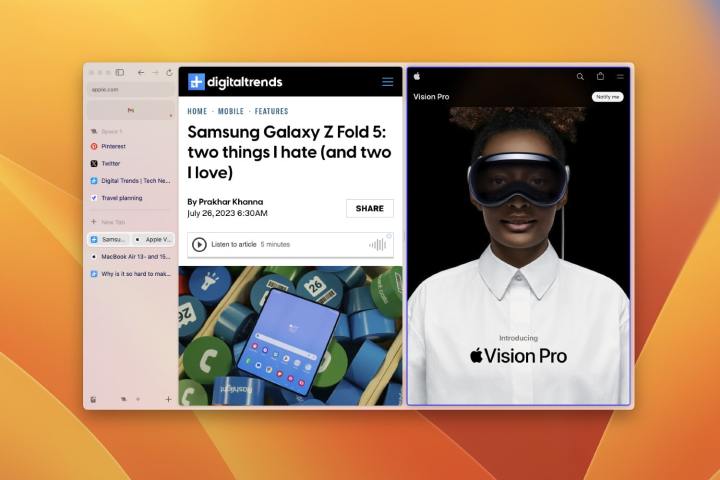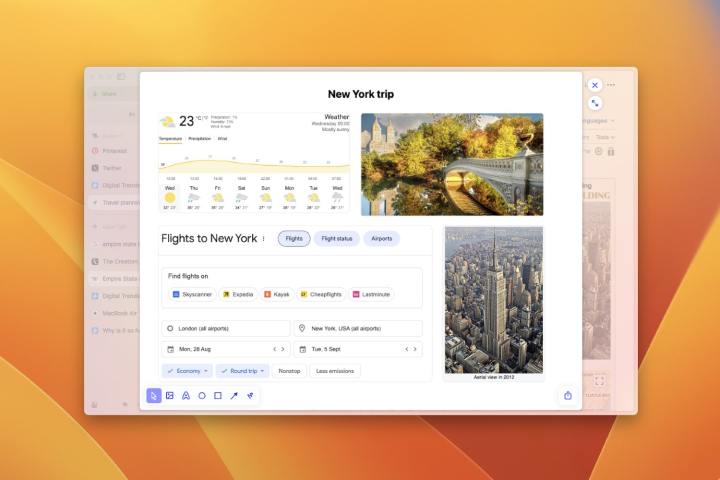Google Chrome is one of the best browsers you can get, and its popularity among internet users is absolutely unrivaled. But there’s a new kid on the block called Arc that aims to steal some of Google’s thunder.
We’ve written about it before, and Arc is an intriguing web browser for a whole host of reasons. But should you ditch Chrome for Arc? That’s what we’re hoping to answer in this guide. Here, we’ve compared the two browsers across a range of metrics, from design and features to performance and security. If you’re not sure which browser is best for you, read on to find out.
Design

Arc isn’t like most browsers, and that’s immediately apparent in its design. This browser embraces a different approach to the user interface, and it works really well most instances.
Instead of running along the top of the browser, you can find your tabs stashed in the left-hand sidebar. You are able to pin your favorite websites, and they appear as block-like icons at the top of the sidebar, making them easy to access. And if you prefer, you can view tabs side-by-side using the Split View feature.
Tabs can be organized into folders for relevant grouping, and you can also sort them into “spaces,” which are navigable using the buttons at the foot of the sidebar. The difference between folders and spaces is that spaces are like tab groups, so you might have a space for holiday research, one for work, etc. You can have folders within spaces, but not the other way around.
Chrome, on the other hand, comes with a much more traditional design. Tabs run along the top of the browser, for example, as they do in most other browsers. It’s a familiar look that doesn’t deviate much from the norm.
It does have a few of the same design touches as Arc, though, such as tab groups. These live in the tab bar and can be condensed or expanded when needed.
Features

Arc really sets itself apart with its extensive range of innovative and unusual features. One of the best is the Easel, which allows you to save interactive web page snippets onto a drawing board. It’s perfect for future planning or gathering your thoughts together, especially if you want to display live weather updates or sports scores on the page. (Right now, it’s only on macOS and not Windows).
Elsewhere, you can download Boosts, which are user-made tweaks and new designs for the browser, or use Arc Max, which infuses the app with artificial intelligence (AI) cleverness. Both of these features are only available on macOS for now.
There’s also a built-in password manager, and Arc is built on the Chromium browser engine, which means you have access to the same large library of extensions as Chrome. You can also sync your spaces, folders, and open tabs to your other logged-in devices (although syncing of passwords, extensions, favorited tabs, and profiles is not yet available). It automatically archives your tabs after a period of time you define (between 12 hours and 30 days) to clear out cruft you no longer need.
What about Chrome? Like Arc, it comes with a built-in password manager, and it can check your existing passwords to root out any weak ones. It syncs a bit more than Arc, covering open tabs, bookmarks, passwords, and more across all your devices.
It’s got some nifty extras in other places too, like Live Caption, which can add subtitles to any video you watch. And Google has been working to integrate generative AI into its browser, which can now organize your tabs, create custom themes, and help you draft messages. And of course, there’s the extensive extension library at your beck and call.
Performance

Since they’re built on the Chromium engine, both Arc and Chrome are very fast web browsers that can render pages at lightning speed. But how close are they, exactly?
To find out, we tested them on both Windows 11 and macOS Sonoma to see how they compare. Our Windows machine has an AMD Ryzen 5 5600X CPU, an Nvidia RTX 3070 graphics card, and 32GB of memory. Our Mac has an M1 Pro chip and 16GB of memory. In both cases, we used clean operating system installations that were running on the latest updates. We ran the popular JetStream 2 and Speedometer 3.0 benchmarking tests for each browser.
Starting with Windows, the results were absolutely neck-and-neck. In the JetStream 2 test, Arc scored 271.609 while Chrome clocked in at 274.922, giving the latter a slender lead. But that was reversed in the Speedometer benchmark, where Arc hit 18.9 +/- 0.95, while Chrome scored 18.3 +/- 0.92. In other words, there was basically no separating the two on Windows.
There was more of a difference in macOS. In the JetStream 2 benchmark, Arc scored 263.942 against Chrome’s 304.833, giving the latter a fairly comfortable lead. Google’s browser again pulled ahead in Speedometer 3.0, where it achieved a result of 28.7 +/- 1.6 versus Arc’s 27.9 +/- 1.3.
At the end of the day, both browsers are very nippy, and everyday users won’t notice much of a difference at all, especially in Windows. But if you’re on macOS and want speed at all costs, Chrome just edges it.
Privacy and security

Google is not exactly known for respecting your privacy, and it has frequently found itself ensnared in security scandals and caught doing questionable things with user data. That doesn’t bode well if you’re keen to protect your private info, and this is one area where Arc definitely surges ahead.
Chrome has some uncomfortable features from a privacy perspective. For instance, it allows all manner of your browser usage data to be sent to advertising companies by default, and you have to dive into the app’s settings to turn this off. There’s an incognito mode, but Google has landed in hot water over how this feature might have misled users into thinking their browsing activity was more protected than it actually was.
It’s not all bad news for Chrome, though. It is frequently updated and patched to defend against vulnerabilities, and it also warns you when you land on a suspicious website, helping you stay safe before you fall victim to a scam or virus. It also offers a safety check that analyzes your passwords, extensions, and security settings and suggests improvements.
Arc, however, is the better option if security and privacy are important to you. That’s because not only is it built upon the same Chromium engine as Chrome — meaning regular security updates come your way — but it disables some of the worst features that are enabled in Chrome.
For example, Arc switches off session fingerprinting and some telemetry reports that Chrome leaves enabled, with Arc’s approach much better for your privacy. It also comes with uBlock Origin installed by default, so you get one of the best ad-blocking solutions there is without having to lift a finger. Arc guarantees that it doesn’t track the websites you visit or sell your data to third parties, and its code is regularly evaluated by a security firm to ensure it is up to scratch.
That all means Arc is the better choice if privacy is a priority. Both browsers are excellent at keeping you safe and secure against online nasties, though.
Should you pick Arc or Chrome?

Both Arc and Google Chrome are really strong browsers, and we’re sure you’ll be happy with either one.
Arc has some amazing features that no other browser can replicate, and it’s great if you’re looking for something a bit different. It’s also much better at respecting your privacy and ensuring your private data remains yours and yours alone. It’s certainly worth trying if you aren’t afraid of trying something new, and you’re a bit tired of Google Chrome. Nothing against Chrome, of course, but as the leader in the space, there’s certainly been a push to find some better alternatives, and now that it’s available for both Windows and Mac, Arc is among the very best.
Editors’ Recommendations







